Both the indigenes, residents and tourists alike, look forward to the annual celebrations of the Osun Osogbo Festival; the festival of the Osun goddess. The festival cuts across all the divides of culture and colour. And at the centrepiece festival is the Arugba (Calabash votary carrier).
But at the centre of the celebrations, both Spiritual, cultural and social is the young virgin maiden, called Arugba. The Arugba, a not more than 15-yearl old virgin girl, is the Osun calabash-carrying votary virgin, which is a traditional allegory of the Virgin Mary; she is the centre of attraction of the festival. The calabash contains all the sacrifices intended to be made in her honour as offerings to the Osun goddess. The Arugba is now worshipped as a goddess rather than just a virgin maid, and when she carries the calabash and leads the crowd to the river, people pray to her and blame all of their problems on her.
The symbolic calabash bearing the sacrifice’s offerings is carried by Arugba. This calabash is thought to have been given to the Osogbo forefathers by the goddess Osun, who stipulated that a royal virgin lady must transport it to the grove on the festival day. The Arugba is closely watched by the Olose (also known as Whip Boys) as she travels to and from the grove because she must avoid stepping on a stone or stump, as this would send the wrong message to the populace.
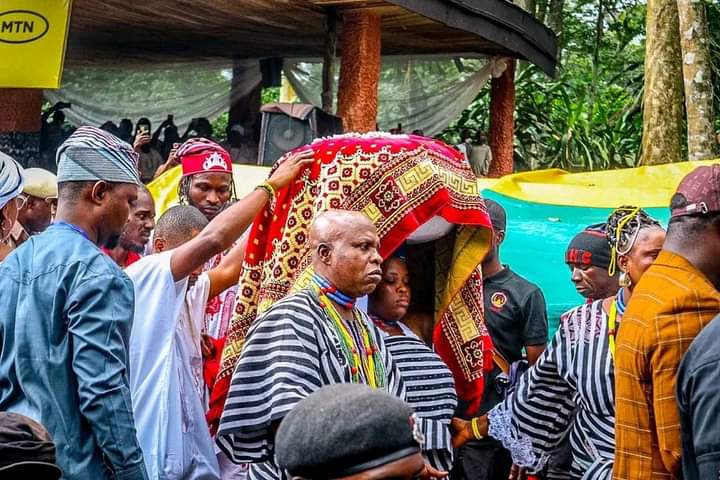
The Osun-Osogbo Grove is several centuries old. It is among the last of such sacred forests that once adjoined the edges of most Yoruba cities before extensive urbanization. In recognition of its global significance and its cultural value, the Sacred Grove was inscribed as a UNESCO World Heritage Site in 2005.
The 1950s witnessed the desecration of the Osun-Osogbo Grove: shrines were neglected and priests abandoned the grove as customary responsibilities and sanctions weakened. Prohibited actions like fishing, hunting and falling of trees in the Grove was done indiscriminately until an Austrian national named Susanne Wenger, later Adunni Olorisha, (1915-2009) helped to reinstate traditional protections.
With the support and encouragement of the then Ataoja of Oshogbo, (the royal king of the time) and the support of the concerned local people. Wenger “formed the New Sacred Art movement to challenge land speculators, repel poachers, protect shrines and begin the long process of bringing the sacred place back to life by establishing it again, as the sacred heart of Osogbo”. Wenger later came to be honoured the titled “Adunni Olorisha” for her custodial efforts and her consistent devotion to the gods of the grove. Today, the Osun River has been contaminated as a result of indiscriminate and unregulated mining activities in the nearby town of Ilesha.
Ever since that year, the Osun-Osogbo Festival is celebrated in August at the Grove. The festival attracts thousands of Osun worshippers, spectators and tourists from all over the world.
Osun-Osogbo Festival is believed to have a history of more than 700 years. Historically, an ancestral occurrence led to the celebration of this festival. Once upon a time, a group of migrants who were led by a great hunter called Olutimehin settled on the bank of the Osun river to save themselves from famine. On the river-side, Yeye Osun the river goddess appeared from the water in front of Olutimehin and requested him to lead people to a special place (the present-day Osogbo town). The goddess promised to protect the group and bring them prosperity in return for an annual sacrifice to her. The group accepted the proposition, and today the annual sacrifice to the Osun River Goddess is still celebrated as the Osun-Osogbo Festival.
In modern times, August is a month of celebration for the people of Osogbo land that includes the traditional cleansing of the city and the cultural reunion of the people with their ancestors, the founders of the Osogbo Kingdom.
The Osun-Osogbo Festival itself is a two-week-long programme. The traditional cleansing of Osogbo is called ‘Iwopopo’, which is followed after three days by the lighting of the 500-year-old sixteen-point lamp called ‘Ina Olojumerindinlogun'(16 face lamp). Then comes the ‘Iboriade’, an assemblage of the crowns of the past rulers, the Ataojas of Osogbo, for blessings.
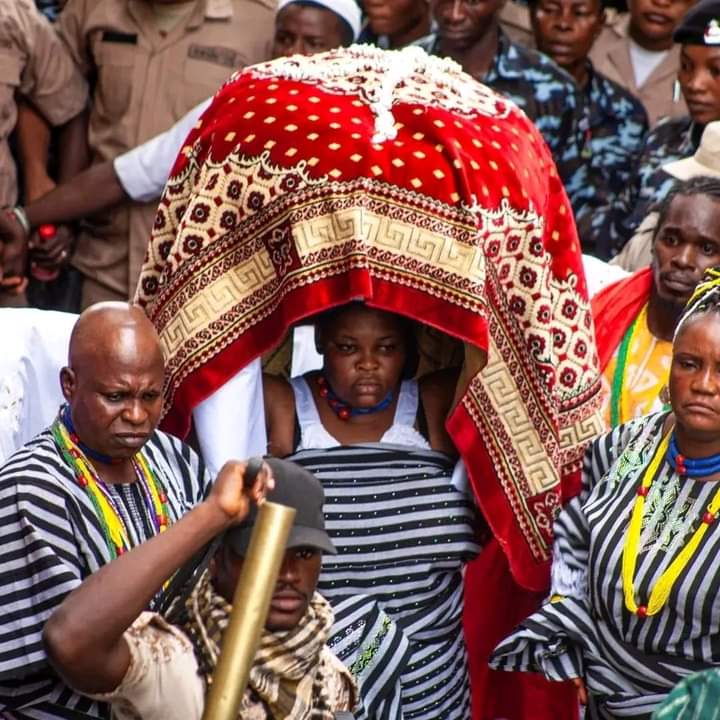
The Festival culminates in a procession to the shrine in the sacred grove where a large crowd builds up. Drumming, dancing, musical performing, wearing of elaborate costumes, speaking of the Yoruba language, recitation of praise poetry, and so on add pomp and colour to the proceedings. This event is led by the sitting Ataoja of Osogbo along with a ritualized performer called the Arugba (calabash carrier) and a committee of priestesses, who reenact the very first meeting between Oluwatimilehin and Yeye Osun. Arugba is played by a young woman of a kingly lineage and offers the sacrifice to the deity.
However, in 2020, the procession was limited to the ritual performers and public participation was suspended due to COVID-19.
Ina, the sacred lamp lit at the beginning of the annual Osun-Osogbo festival
The festival is of immense benefit to the tourism sector of Nigeria. It enables the community to sell its culture to tourists coming from both within the country and from all over the world.
The Osun-Osogbo festival also serves as a strong unifying factor in Osogbo land, as irrespective of the different social, economic, religious and political convictions of the people, they all come together annually to celebrate the goddess.
A statue signifying the maternity nature of iya osun at the sacred grove of osun
In 2023, as in previous years, the Osun Festival which kick-off a few weeks ago, from early August, and climaxed with the procession of maiden calabash bearer (Arugba), the Ataoja, Osun adherents and culture enthusiasts to the ancient groove on Friday (9 August).
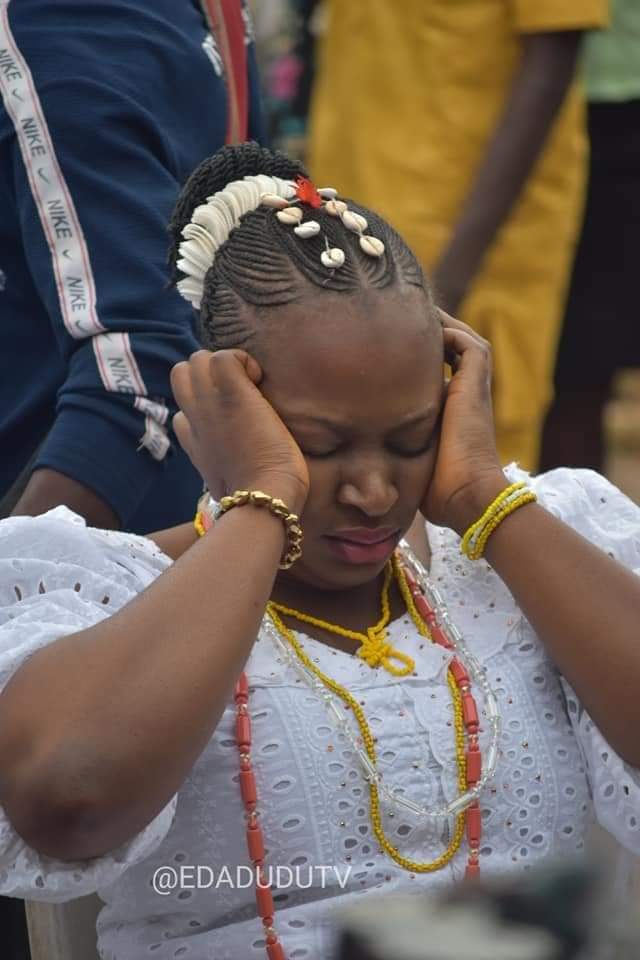
The international festival is a five-day event usually celebrated in August, attracting tourists within and outside the country swarming the streets of Osogbo to join the annual rites, with thousands escorting the maiden calabash bearer to the shrine to show gratitude to the Osun goddess.
The act that is performed by the Ataoja and the Arugba is an important reconstruction of the occasions in Osogbo’s early history. First off, Olarooye, the first Ataoja, sat on the same stone that the current Ataoja is currently sitting on when he was about to make the first sacrifice to the goddess during the settlement of Osogbo. Additionally, the current Ataoja communes with the goddess and asks for her continuing assistance and protection in the upcoming year, just as Olarooye did before and after making the first sacrifice to the Osun goddess.
Finally, the Ataoja feeds the goddess like his ancestor and receives good tidings just as Olarooye received god-fish on his palm, which earned him the title “Atewogbeja,” shortened to ‘Ataoja’. The feeding of the goddess by the Ataoja marks the end of the rituals of the Osun festival and confirms that the waters of the river are blessed.
After the conclusion of the ritual, people will start shouting “Ore Yeye Osun,” which is Yoruba for “We adore you, Osun the Great Mother.” Additionally, people start drinking river water and collecting it in various kinds of containers, some of which they use to wash their faces. People believe that the river’s sacred waters, which are immediately available following the sacrifice, have the ability to heal all illnesses, including infertility, chronic headaches, and other conditions. Following that, the Ataoja and other individuals returned to the palace, where singing, drumming, and other forms of entertainment continued. The entire town of Osogbo is thrown into a celebratory mood thereafter. The singing of Osun praise poems (Oriki Osun) and festival songs (Orin Odun), which have a lot of historical significance, is one of the key components of the celebration of the Osun festival.
Poems and songs are extremely essential to the Yoruba culture, and there is never a Yoruba culture without lyrically beautiful traditional melodies. In reality, music serves as a mirror through which the Yoruba culture may be comprehended in its entirety because they use it not only to preserve and convey their past but also to call upon the spirits of their many Orisa. Throughout the two-week Osun celebration, worshipers and followers of the goddess of Osun shout praise and invoke her spirit at various times and locations. As previously mentioned, Osun praise poems and songs are rich in historical references that highlight the role of the Osun goddess in Yoruba cosmic mythology and Osogbo history. Below is a sample from one of those poems that highlight Osun’s significance in Osogbo’s history:
Sholagbade Ewuji,
mo kore Yeye f’Osun
Taa ni o momo p’Osun Osogbo Nii b’Oba selu Osogbo o?
Osun Osogbo ni o ba mi Seyi ni temi.
Translation:
Solagbade Ewuji,
I salute the Great Mother, Osun.
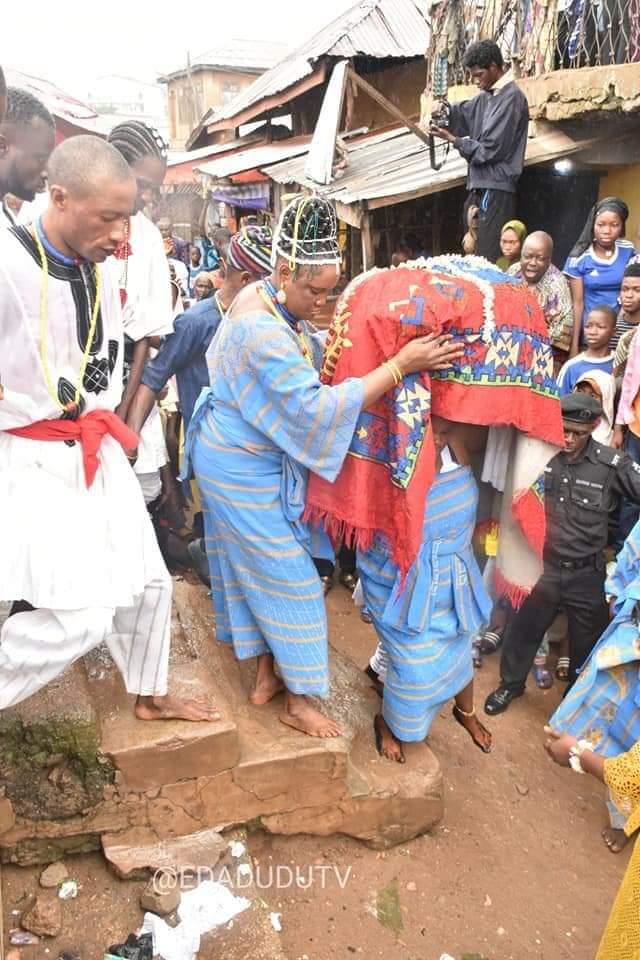
Who does not know that it is the Osun Osogbo who helps the Oba manage or rule Osogbo?
Osun-Osogbo is the one who will help me accomplish this one of mine.
Some of the words in the poem mentioned above depict her historical contributions to the creation, expansion, and development of Osogbo. First, Osun’s designation as the “Great Mother” (Yeye) in the poem refers to the goddess’ power to cure all types of human illnesses, especially those that affect mothers and young children. It also suggests that she can help infertile men and barren women become parents.
According to Osogbo legends, the goddess assisted Olarooye, the first Ataoja whose wife had difficulty conceiving children, to have children after consuming river water. This was the basis for the myth that the goddess could cure infertility and barrenness, which is why pregnant women flock to the grove during festival celebrations. The poem’s line that “it is Osun who helps the Oba rule Osogbo” refers to the goddess’ maternal role in the founding and development of Osogbo. The residents of Osogbo hold the belief that the Osun goddess generously permitted their forefathers to colonise their land and have since provided protection and security to the community. It is also asserted that the goddess’ continuous power and protection played a role in the fact that Osogbo had never been vanquished or conquered during a conflict. The residents of Osogbo even believe that the goddess actively took part in the famous battle of Osogbo between Ibadan warriors and Fulani Jihadists by disguising herself as a food vendor and tricking the Jihadists into eating poisoned bean cakes, which rendered them incapacitated, in order to fulfil her promise to keep Osogbo safe from invaders.
The current Arugba, 𝗢𝘀𝘂𝗻𝘁𝗼𝗺𝗶 𝗢𝘆𝗲𝘁𝘂𝗻𝗷𝗶, is the young daughter of the sitting Ataoja of Osogbo. She took over from Abolade Oyewale, who carried the sacrifice calabash to the river goddess and was herself considered a goddess for 10 years.
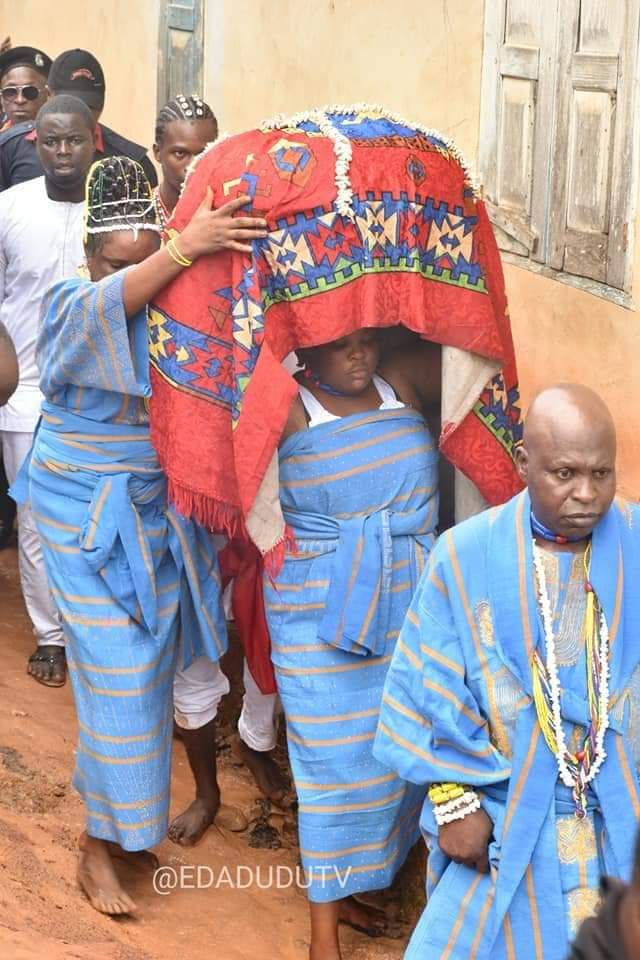
Every August, Osogbo town plays host to one of the most interesting festivals in the world, the Osun Osogbo Festival. Since the town became host of the country’s second World Heritage site, the gravitation pull of adventurous tourists has become hard to resist. It’s a festival that allows tourists to discover the plains, the streams and forest of Osogbo, the land of Oroki, famed for its indigo dye, ‘aro’.
The one month long festival is believed to be a covenant between the indigenes and the water goddess, during which time, the indigenes thank the water goddess for the peace, tranquillity and prosperity bestowed on the town by the goddess and also to ask for more favours from the goddess for the next year.
The Arugba is led by the most senior Osun priestess and Aworo Osun from the premises of the palace of the reigning Ataoja of Osogbo, enveloped on both sides by a formidable human fence, who must ensure that she gets to her destination without incident and, more importantly, with the calabash intact. As the tradition goes, the virgin so chosen ‘’is the personification of the goddess Osun and must not stumble’.
Arugba is carefully chosen by the priests. Sources say that as soon as these votary maids are picked, they live under the watchful eyes of the Ataoja during the periods that they serve as Arugba. Once an Arugba is picked, she more or less, becomes kabiyesi’s (king) daughter. She lives under the care and watchful eyes of the kabiyesi. This is because she must not know any man while she still bears the Osun calabash; so they don’t enjoy some freedom that their mates enjoy.” The Arugba’s are allowed to quit when they are matured enough to get married.
The practice, over the years, has been that the Arugba must be a virgin, a spinster from the king’s extended family, and must be chosen for the role by Ifa divination picked from ages 11 or 12 and dedicated to the service of the River goddess Yeye Osun, until she eventually gets matured. Usually, she would serve the town for about three to four years before she grows into womanhood, but with civilisation and most of them attending schools, the Arugba now serves the town or the River goddess for over ten years for those picked at tender ages.
Arugba is not allowed to eat certain foods like, fish, snail, guinea corn, because Osun does not take them.
Whilst lots of restrictions are placed on the social life of the votary maid, she’s allowed to go to school and mingle with her friends. Though spiritual, being Arugba does come with its own perks such as enjoying preferential treatment in school, one of which is spotting long hair while other students kept short hair and getting whatever she desires from the ruling king.
Fellow students are wary of her but for those who are close to her, a former Arugba once said, she is completely harmless. She wore school uniform all through her years of studies except for two bracelets on her wrists which should never be taken off’. Of course that caused some few skirmishes with teachers, of which one physically yanked it off and the consequences were immediately devastating, she recanted.


 Main Story2 years ago
Main Story2 years ago
 News2 years ago
News2 years ago
 Sports1 year ago
Sports1 year ago
 Business2 years ago
Business2 years ago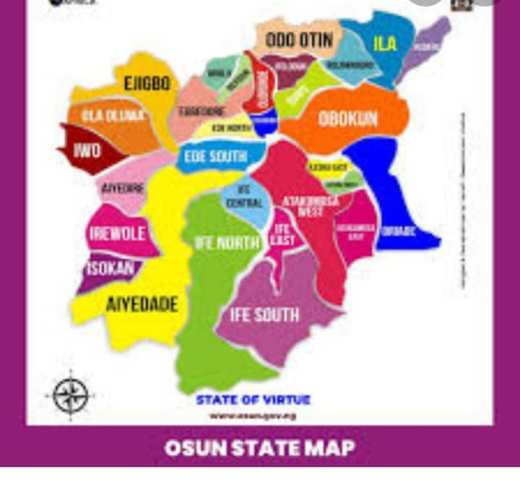
 Featured2 years ago
Featured2 years ago
 Main Story1 year ago
Main Story1 year ago
 News2 years ago
News2 years ago
 Economy2 years ago
Economy2 years ago







